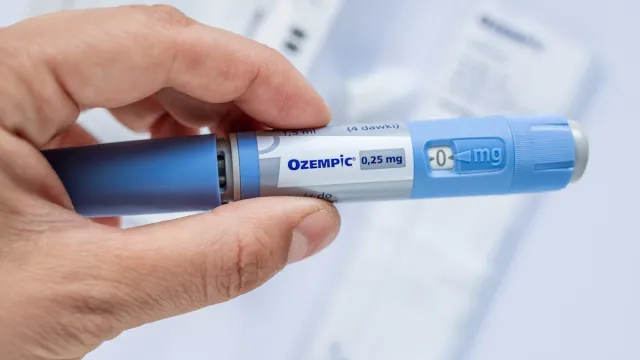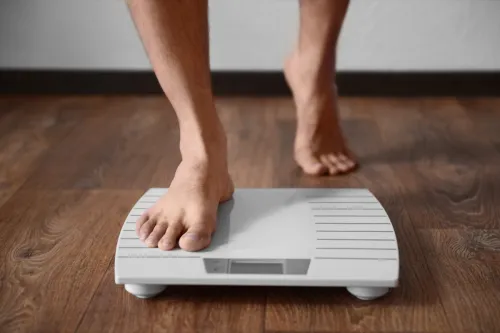Ozempic and Wegovy Can Cause 3 Severe Stomach Conditions, New Study Says
Researchers looked at data from non-diabetic patients taking the drugs.

Both Ozempic and Wegovy have made headlines lately, helping people achieve challenging weight loss goals and manage their diabetes. But despite these positive benefits, like other treatments, there are also associated side effects, with more patients reporting uncomfortable and even debilitating adverse events. Now, a new study suggests that drugs like Ozempic and Wegovy may be linked to three severe stomach conditions. Read on to find out what researchers found.
RELATED: Ozempic Patient Reveals "Excruciating" New Side Effect.
The study evaluated patients who don't have diabetes.

While Ozempic is only indicated for the treatment of type 2 diabetes, Wegovy is approved for the treatment of obesity, but both are often prescribed for weight loss. The drugs are glucagon-like peptide 1 (GLP-1) agonists, which slow down digestion and decrease appetite, thus helping shed pounds. But they can also cause issues if digestion slows too much.
Previous studies found that these drugs increase the risk of gastrointestinal (GI) issues in patients with diabetes, and these patients are at increased risk for certain conditions even if they're not taking GLP-1s. In light of this, a new study published in JAMA this week investigated the risks in non-diabetic patients using the drugs for weight loss (specifically semaglutide, the active ingredient in Ozempic and Wegovy, and liraglutide, another GLP-1). One of the study authors, Mohit Sodhi, told CNBC that researchers wanted to "take diabetes out of the equation."
Interestingly enough, when looking at health insurance claims from 16 million non-diabetic patients in the U.S. on GLP-1s, researchers found that they, too, are at risk for the following three rare and severe stomach conditions.
RELATED: Shoppers Are Turning Away From Walmart—And Ozempic May Be to Blame.
1
Stomach paralysis

There has been much discussion about stomach paralysis in patients taking Ozempic and Wegovy. The condition, formally known as gastroparesis, affects the nerves and muscles in the stomach, slowing and weakening muscle contractions needed to digest and pass food through the intestines, according to the Cleveland Clinic. The condition leads to painful symptoms such as cyclic vomiting, which can then cause dehydration.
While GI issues are cited on the warning labels for drugs like Ozempic and Wegovy, stomach paralysis is not. However, the new study, conducted by researchers at the University of British Columbia, suggests that it should be, as results showed patients had an increased risk of developing the condition.
The higher risk was determined by comparing patients taking GLP-1s to those taking bupropion-naltrexone, another weight loss treatment that goes by the brand name Contrave. Per the study data and CNBC, those on GLP-1s had a three times higher risk of stomach paralysis than those on bupropion-naltrexone.
And though this might seem like a small number, a fellow study author, epidemiologist Mahyar Etminan, told CNN, "When you have millions of people using these drugs, you know, a 1% risk still translates to many people who may experience these events."
RELATED: Ozempic Patient Reveals "Crazy and Scary" Side Effects That Made Her Quit.
2
Bowel obstruction

Patients taking GLP-1s for weight loss also had an increased risk of bowel obstruction, study data suggests. Compared with those on bupropion-naltrexone, those on GLP-1s had a four times higher risk of bowel obstruction.
Speaking to this, the U.S. Food and Drug Administration (FDA) just updated the label for Ozempic to acknowledge Ileus, which is the medical term for "movement somewhere in the intestines that leads to a buildup and potential blockage of food material," HRS explains on its website. "An ileus can lead to an intestinal obstruction. This means no food material, gas, or liquids can get through."
RELATED: Woman With Incurable Stomach Condition Says Ozempic "Isn't Worth This."
3
Pancreatitis

Non-diabetic patients also had an increased risk of pancreas inflammation, formally known as pancreatitis. Patients on GLP-1s had a nine times higher risk of this condition than those on bupropion-naltrexone.
Like bowel obstruction, the drug labels also warn about pancreatitis risk.
RELATED: Ozempic Maker Sued Over Alleged Side Effect Sending Patients to ER.
The drugmaker "stands behind the safety and efficacy" of Ozempic and Wegovy.

The study also looked at biliary disease, which "refers to diseases affecting the bile ducts, gallbladder and other structures involved in the production and transportation of bile," according to The George Washington University Hospital. Patients taking GLP-1s did not have an increased risk for these conditions when compared to those on bupropion-naltrexone.
A spokesperson for Novo Nordisk, the maker of both Ozempic and Wegovy, reiterated to Best Life that some GI side effects cited in the study are already noted on the labels.
"[Novo Nordisk] stands behind the safety and efficacy of all of our GLP-1 medicines when used consistent with the product labeling and approved indications," the spokesperson said in an email. "We recommend patients take these medications for their approved indications and under the supervision of a healthcare professional. Treatment decisions should be made together with a healthcare provider who can evaluate the appropriateness of using a GLP-1 based on assessment of a patient's individual medical profile."
Regardless, researchers hope that their findings might be enlightening for patients taking the drugs for weight loss.
"We're all big proponents for informed patient consent," Sodhi told CNBC. "If someone has decided they would like to take a GLP-1 for weight loss, we encourage them to have a conversation with their provider about how it may help them achieve their goals. But they should also be made aware of the potential drawbacks of taking this medication."
Study authors did note limitations, however, specifically that GLP-1 agonist users that were evaluated had a record of obesity without diabetes, but it was "uncertain" whether GLP-1s were used for weight loss in every situation. In addition, the health insurance claims were dated between 2006 and 2020, which was prior to Wegovy being on the market.
RELATED: For more up-to-date information, sign up for our daily newsletter.
Best Life offers the most up-to-date information from top experts, new research, and health agencies, but our content is not meant to be a substitute for professional guidance. When it comes to the medication you're taking or any other health questions you have, always consult your healthcare provider directly.
- Source: https://www.fda.gov/news-events/press-announcements/fda-approves-new-drug-treatment-chronic-weight-management-first-2014
- Source: https://jamanetwork.com/journals/jama/fullarticle/2787907
- Source: https://jamanetwork.com/journals/jama/fullarticle/2810542
- Source: https://my.clevelandclinic.org/health/diseases/15522-gastroparesis
- Source: https://www.ncbi.nlm.nih.gov/pmc/articles/PMC4771085/





















